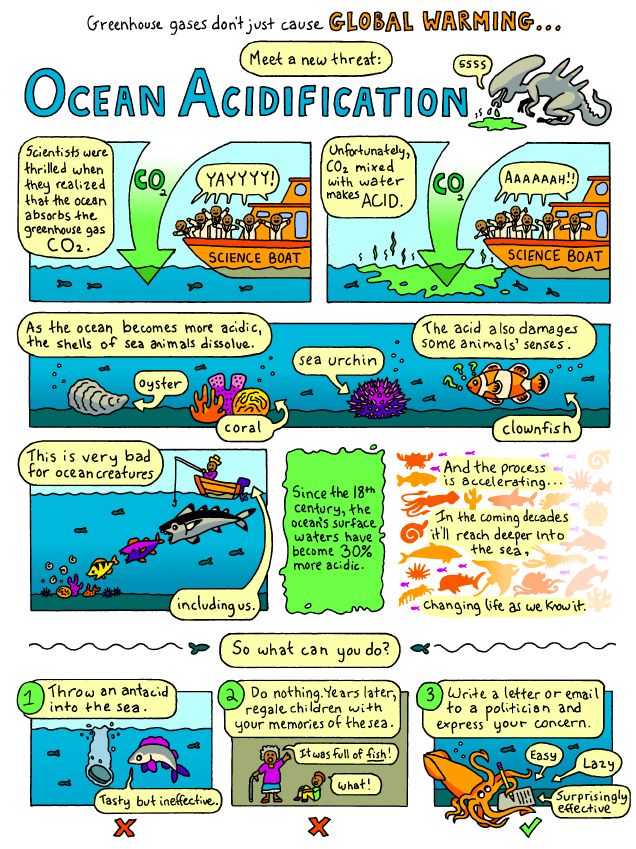Oceans slow down global warming but at the cost of “their health”. The oceans absorb approximately 30% of the total CO2 emissions from human activities[1]. However, this CO2 absorption produces a variety of chemical changes in seawater, collectively known as ocean acidification. But Ocean acidification has been labeled as the evil twin of global warming because of its harmful consequences for marine life.
The increased seawater acidity (i.e. pH reduction) produced by the CO2 absorption reduces the concentration of carbonate ions in the ocean. These are the building blocks for marine organisms with shells such as corals (hotspots of biodiversity that support 25% of marine live), shellfish (food sources), and microalgae (base of food webs). As the concentration of carbonate ions decreases, these organisms struggle to build their shells. And, if the decrease in the concentration of carbonate ions is large enough, marine shells can start to dissolve. But should we worry about ocean acidification or can the Earth’s natural processes restore the equilibrium prior to human perturbation?
Last time our planet experienced such fast change in atmospheric CO2 was 252 million years ago, and it took around 10,000 years for natural processes to restore equilibrium[2]. At that time, 90% of all marine species and 70% of all terrestrial species disappeared. It was the largest mass extinction event ever recorded, known as the Permo–Triassic Boundary mass extinction event. Ocean acidification was one of the main players of the extinction of the marine species, and the rate of CO2 released by volcanic eruptions was similar to modern anthropogenic emissions[2]. This fast rate of CO2 release was a critical factor driving ocean acidification[3].
We can prevent the worst-case scenario by reducing CO2 emissions. Industry, governments and citizens must work together to reduce emissions. Oceanic uptake of atmospheric CO2 might reduce global warming, but the resulting ocean acidification is far from positive. Ocean acidification is a global threat that could have dreadful consequences. Everyone can help to maintain a healthy ocean and a healthy planet for our generations and for generations to come. Together we can defeat the EVIL TWIN!

Ocean acidification © bird and moon comics
References
[1] C. Le Quéré, R. Andrew, P. Friedlingstein, S. Sitch, J. Pongratz, A. Manning, J. Korsbakken, G. Peters, J. Canadell, R. Jackson, T. Boden, P. Tans, O. Andrews, V. Arora, D. Bakker, L. Barbero, M. Becker, R.A. Betts, L. Bopp, F. Chevallier, L.P. Chini, P. Ciais, C.E. Cosca, J. Cross, K. Currie, T. Gasser, I. Harris, J. Hauck, V. Haverd, R.A. Houghton, C.W. Hunt, G. Hurtt, T. Ilyina, A.K. Jain, E. Kato, M. Kautz, R.F. Keeling, K. Klein Goldewijk, A. Körtzinger, P. Landschützer, N. Lefèvre, A. Lenton, S. Lienert, I. Lima, D. Lombardozzi, N. Metzl, F. Millero, P.M.S. Monteiro, D.R. Munro, J.E.M.S. Nabel, S.-I. Nakaoka, Y. Nojiri, X.A. Padín, A. Peregon, B. Pfeil, D. Pierrot, B. Poulter, G. Rehder, J. Reimer, C. Rödenbeck, J. Schwinger, R. Séférian, I. Skjelvan, B.D. Stocker, H. Tian, B. Tilbrook, I.T. van der Laan-Luijkx, G.R. van der Werf, S. van Heuven, N. Viovy, N. Vuichard, A.P. Walker, A.J. Watson, A.J. Wiltshire, S. Zaehle, D. Zhu, «Global Carbon Budget 2017», Earth Syst. Sci. Data Discuss., in review, doi:10.5194/essd-2017-123, 2017.
[2] M. Clarkson, S. Kasemann, R. Wood, T. Lenton, S. Daines, S. Richoz, F. Ohnemueller, A. Meixner, S. Poulton, E. Tippers, «Ocean acidification and the Permo-Triassic mass extinction», Science, 348, 229-232, doi:10.1126/science.aaa0193, 2015.
[3] B. Hönisch, A. Ridgwell, D. Schmidt, E. Thomas, S. Gibbs, A. Sluijs, R. Zeebe, L. Kump, R. Martindale, S. Greene, W. Kiessling, J. Ries, J. Zachos, D. Royer, S. Barker, T. Marchitto Jr., R. Moyer, C. Pelejero, P. Ziveri, G.L. Foster, B. Williams, «The Geological Record of Ocean Acidification», Science, 335, 1058-1063, doi:10.1126/science.1208277, 2012.







